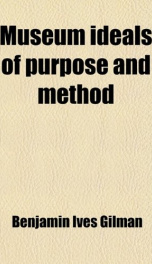museum ideals of purpose and method

Purchase of this book includes free trial access to www.million-books.com where you can read more than a million books for free. This is an OCR edition with typos. Excerpt from book: ? THE SKIASCOPE The Skiascope In Use A Long and unfamiliar name for a small and not unfamiliar thing. The word means " shadow-seer," the seer from and into shadows (a-ieia, shadow; ???????, to see). The skiascope uses looking from shadow as a means of looking into shadow. It has been devised for the purpose of demonstrating a visual principle not yet given the importance it deserves by museum people. For good seeing, it is more important that the eyes should be sufficiently shaded than that the object should be abundantly lighted. To prove this principle we must provide some means of diminishing our field of view so that the eyes are shaded approximately from everything except the object looked at. The skiascope does this in handy fashion, with the result that we see things well through it in almost any lighting. The instrument has, therefore, at once a practical and a theoretical value. The user not only sees better with it but also learns that the chief obstacle to seeing things well is generally glare from elsewhere. In artificial lighting the importance of keeping sources of light out of the eyes is now admitted. The lesson was taught conspicuously at the Panama-Pacific Exposition, and later at the Statue of Liberty in New York Harbor. We have found that the best way to show things at night is not to light them up in the old fashion, by distributing sources of light over them to dispute the observer's visual strength with the objects to be seen, but to show them in a glow, which, though it may be dimmer, contains no brilliant points to deaden the susceptibility of the eyes. In natural lighting it may be impossible to conceal the sources of light: for example, the low windows or the ceiling lights of a side- or top-lighted museum gallery. An alternative in ...
Info about the book
Author:
Series:
Unknown
ASIN:
B008HSQ0JC
Rating:
3.5/5 (4)Your rating:
0/5
Languge:
English
Users who have this book
Users who want this book
What readers are saying
What do you think? Write your own comment on this book!
write a commentif you like museum ideals of purpose and method try:
Other books by this author
Do you want to read a book that interests you? It’s EASY!
Create an account and send a request for reading to other users on the Webpage of the book!

